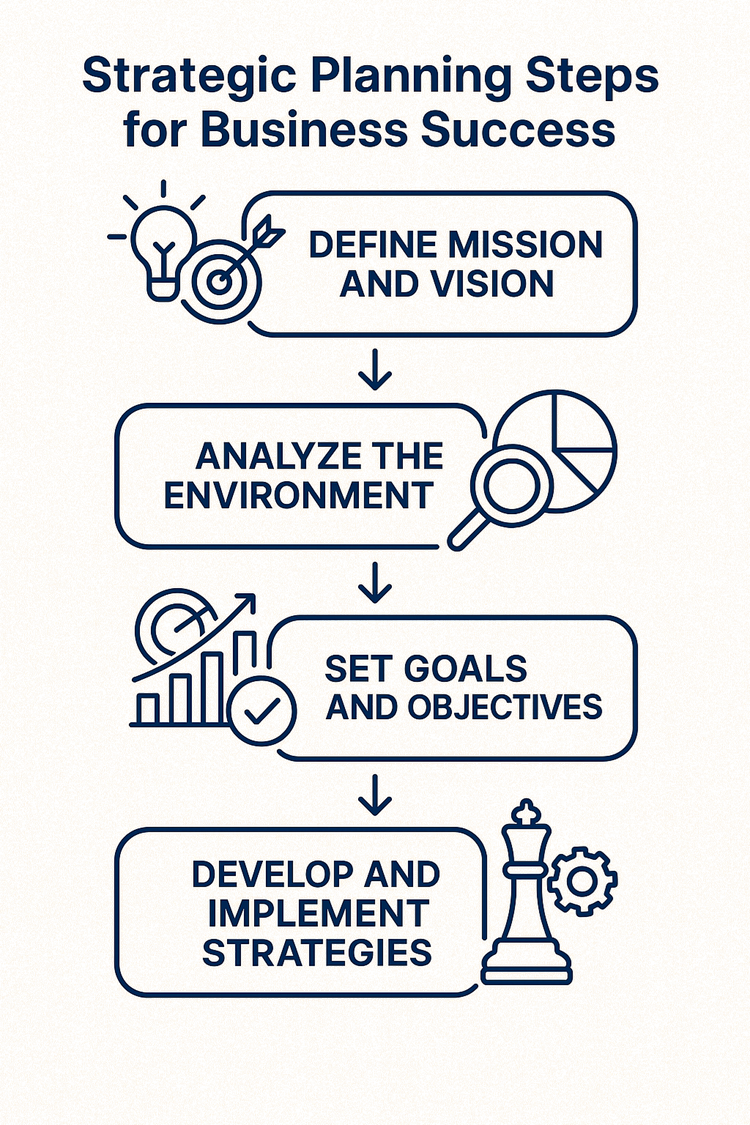How Strategic Planning Drives Business Success
- KPM SMARTBiz

- Jul 9
- 4 min read
Strategic planning is an essential process that helps businesses establish their long-term goals and the direction needed to achieve them. By integrating this structured approach into their operations, organizations can improve their decision-making, allocate resources more effectively, and enhance overall performance. In this blog post, we will explore the various aspects of strategic planning and how it contributes significantly to business success.
Understanding Strategic Planning
Strategic planning is a systematic process that defines a company's direction and priorities over a specific timeframe, usually three to five years. It involves analyzing internal strengths and weaknesses, external opportunities and threats, and aligning resources to capitalize on potential gains. Effective strategic planning provides clarity and reduces uncertainty by offering a roadmap for the organization.
Businesses that engage in strategic planning often experience greater coherence and consistency across their departments. This involves clearly defined goals, measurable objectives, and an overall understanding of how every team contributes to the company's success.
The Importance of Strategic Planning
Having a well-documented strategic plan is vital for several reasons. First and foremost, it ensures all employees are on the same page regarding the company's goals. A shared vision leads to improved collaboration and communication among staff members.
Secondly, strategic planning helps businesses anticipate potential challenges and prepare accordingly. According to the Harvard Business Review, organizations with a robust strategic plan are 10% more likely to achieve their objectives than those without one. This not only increases efficiency but also strengthens the organization’s ability to adapt to change.
Lastly, a strategic plan serves as a guideline for resource allocation. By understanding where to allocate time, money, and effort, companies can optimize their operations and improve their bottom line.
Key Components of Strategic Planning
Successful strategic planning typically includes several core components:
Mission Statement: This defines the organization's purpose, values, and core objectives. It should be concise and serve as the guiding principle for decision-making.
Vision Statement: A vision statement describes what the company aspires to achieve in the future. It should inspire and motivate employees while providing a clear direction.
SWOT Analysis: This analytical tool assesses the company's strengths, weaknesses, opportunities, and threats. By examining these elements, businesses can identify areas for improvement and leverage their advantages in the market.
Strategic Goals: These are the high-level objectives that a company wants to achieve. They should be specific, measurable, achievable, relevant, and time-bound (SMART).
Action Plans: These outline how the organization will accomplish its strategic goals. Action plans should include specific tasks, timelines, assigned responsibilities, and performance indicators.
By incorporating these elements into their strategic plan, businesses can create a solid foundation for success.
Implementing a Strategic Plan
The success of a strategic plan lies not only in its creation but also in its implementation. Here are some actionable steps to effectively execute a strategic plan:
Engage Employees: Involve staff members in the planning process. By soliciting their input and feedback, you can ensure greater buy-in and commitment to the plan.
Communicate the Plan: Make the strategic plan accessible to all employees. Use various communication channels such as team meetings, internal newsletters, or company intranets to disseminate information.
Monitor Progress: Regularly review and assess the progress towards your strategic goals. Implement performance metrics to gauge success and identify areas needing adjustment.
Emphasize Flexibility: While a strategic plan provides a roadmap, organizations should remain adaptable. Economic conditions and industry trends can change rapidly, and being open to recalibrating strategies is crucial.
Seek Expert Guidance: Leveraging strategic consulting services can provide additional insights and expertise. External consultants can offer invaluable advice based on industry best practices and trends.
By following these steps, businesses can effectively implement their strategic plans and ensure a higher likelihood of achieving their long-term goals.
Measuring Success in Strategic Planning
To evaluate the effectiveness of a strategic plan, organizations must establish KPIs (Key Performance Indicators). These metrics offer quantifiable measures of performance, allowing businesses to track their progress toward goals and make necessary adjustments.
Common KPIs include revenue growth, market share increases, customer satisfaction scores, and employee engagement levels. For example, a 20% increase in customer satisfaction after implementing a new service can be a clear indicator that the strategic plan positively impacts business outcomes.
Regularly reviewing KPIs ensures that companies stay on course and can pivot where necessary. This process should become a routine part of the organizational culture, shaping decisions and strategies in real-time.
The Future of Strategic Planning
As we look ahead, the role of strategic planning is likely to evolve. Technological advances, especially in automation and data analytics, will enhance the planning process. Businesses will increasingly rely on data-driven insights to make decisions, allowing for more agile and responsive strategies.
Moreover, the global business environment is becoming more complex and interconnected. Companies will need to adapt their strategic planning to address these challenges, considering factors like remote work, sustainability, and technological disruptions.
Organizations that prioritize long-term strategic planning while being flexible enough to adjust to changes will have a competitive advantage. As we continue to evolve, the synthesis of innovation and strategic foresight will be critical for sustained success.
In today’s fast-paced business world, the relevance of strategic planning cannot be overstated. By developing a clear vision, implementing effective processes, and continuously measuring success, businesses can position themselves for long-term growth and sustainability. Embracing strategic consulting services can also provide additional expertise and insights to navigate the complexities of modern business landscapes. With a commitment to strategic planning, the future looks bright for organizations ready to seize opportunities and overcome challenges head-on.








Comments